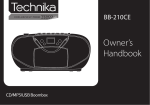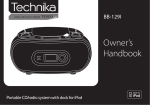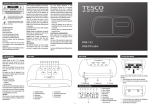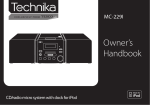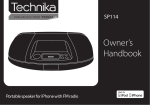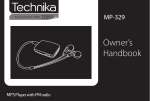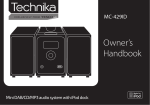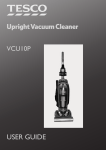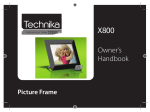Download Tesco.com DAB109FD Marine Radio User Manual
Transcript
User Guide DAB109FD DAB Radio IMPORTANT SAFETY INFORMATION CAUTION! RISK OF ELECTRIC SHOCK DO NOT OPEN TO REDUCE THE RISK OF ELECTRIC SHOCK DO NOT REMOVE COVER (OR BACK) This symbol indicates that there are important operating and maintenance instructions in the literature accompanying this unit. This symbol indicates that dangerous voltage constituting a risk of electric shock is present within this unit. Read these instructions. Keep these instructions. Heed all warnings. Follow all instructions. Do not use this apparatus near water. Clean only with a slightly damp cloth. Do not block any ventilation openings. Install in accordance with the manufacturer’s instructions. Do not install or operate near any heat sources such as radiators, stoves, or other apparatus that produce heat. Unplug this apparatus during lightning storms or when unused for long periods of time. Refer all servicing to qualified service personnel. Servicing is required when the apparatus has been damaged in any way, such as the power-supply cord or plug is damaged, liquid has been spilled or objects have fallen into the apparatus, the apparatus has been exposed to rain or moisture, does not operate normally, or has been dropped. Warning: To reduce the risk of fire or electrical shock, do not expose this product to rain or moisture. The product must not be exposed to dripping and splashing and no object filled with liquids such as a vase of flowers should be placed on the product. No naked flame sources such as candles should be placed on the product. Caution: Changes or modifications not expressly approved by the manufacturer could void the user’s authority to operate this device. Caution: Usage of controls or adjustments or performance of procedures other than those specified herein may result in hazardous exposure. 1 IMPORTANT This equipment generates, uses and can radiate radio frequency energy and, if not installed and used in accordance with the instructions, may cause harmful interference to radio communication. However, this is no guarantee that interference will not occur in a particular installation. If this equipment does cause harmful interference to radio or television reception, which can be determined by turning the equipment off and on, the user is encouraged to try to correct the interference by one of the following measures: - Reorient or relocate the receiving antenna. - Increase the separation between the equipment and receiver. - Connect the equipment into an outlet on a circuit different from that to which the receiver is connected. - Consult the dealer or an experienced radio/TV technician for help. ELECTRICAL INFORMATION Mains Supply: The mains operating voltage of this unit is marked on a rating plate on the back of the unit. The means of disconnecting this appliance from the mains supply is the mains plug. This should be unobstructed and readily operable at all times. INDEX INDEX Introduction.............................................................2 Unpacking................................................................2 Controls & connections.............................................3 Display features........................................................5 Fitting batteries........................................................5 AC mains operation..................................................6 Battery operation.....................................................6 Getting started.........................................................6 Station tuning..........................................................7 FM reception.............................................................7 Presets......................................................................7 Alarm functions........................................................8 Sleep mode..............................................................9 Scanning..................................................................9 Manual tuning..........................................................9 Display modes........................................................10 Headphones...........................................................11 System reset...........................................................11 Care & Maintenance...............................................11 Specifications.........................................................11 Warranty................................................................11 INTRODUCTION PRELIMINARIES Introduction DAB (Digital Audio Broadcasting) technology allows many more radio stations compared to FM. DAB transmissions do away with problems of hiss and fade that plague AM and FM broadcasts and are less likely to be affected by adverse weather conditions or other sources of interference. In addition to speech and music DAB transmissions carry high levels of data - far greater than the limited RDS information available on FM stations. Unlike FM, DAB is broadcast on many frequencies. Many countries in Europe, including the UK use Band III (174-240 MHz); others, France for example, use the L-Band (14521492 MHz). Germany uses both bands. Your radio can tune Band III. Countries in Europe that use Band III include: Belgium, Denmark, Holland, Italy, Norway, Portugal, Spain, Sweden, Switzerland. Your radio will tune stations in all these countries. Your radio cannot receive French or German stations broadcasting in the L-Band though FM services are available all over Europe. Being digital, DAB transmissions can have a wider frequency range and greater dynamics than that available with FM technology. FM reception is available on the DAB109FD for use in those locations where there is no usable DAB service. A headphone output is provided for personal listening. UNPACKING Carefully unpack the unit. If it is damaged, please return it to your nearest Tesco store for replacement. Remember to take your purchase receipt with you. Retain the User Handbook. If you pass the unit on to a third party make sure you pass on the handbook. We suggest you retain the packaging. If you dispose of it, do so having regard to any recycling regulations in your area. 2 CONTENTS The carton should contain: • The DAB109FD digital radio • Power cord • Operating Manual If any items are missing or damaged, contact your nearest TESCO store for a replacement. Have your receipt ready when you call. Retain the packaging. If you dispose of it, do so having regard to any recycling regulations in your area. LOCATION Place the unit on dry stable surface away from heat and damp and where it is unlikely to fall or be knocked over. CONTROLS AND CONNECTORS FRONT VIEW a b c d e f g h i 1) 1! r 3 DAB/FM button Display Next button Previous button Select button Alarm/Snooze button Preset button Volume control Sleep button Standby/On button Info button Menu button CONTROLS AND CONNECTORS BACK VIEW a b c d 4 Headphone jack DAB/FM aerial AC Inlet Battery compartment DISPLAY FEATURES FITTING BATTERIES DAB RADIO DISPLAY Station name Information display FM RADIO DISPLAY Station name Stereo/Mono indication (stereo shown) b Lay the ribbon across the battery compartment (this will assist with removing the batteries when exhausted). c Fit 4 x AA batteries, observing polarity a Slide the battery cover off in the direction indicated as shown. RDS scrolling text (when available) d Slide the battery cover back into position on the radio. 5 AC MAINS OPERATION BATTERY OPERATION GETTING STARTED CONNECTING POWER • Check that the mains voltage marked on the rating plate on the back panel is the same as the voltage in your area. • Plug the AC power cord into the AC inlet • Plug the mains plug into the wall socket and switch the mains power on. FITTING BATTERIES Referring to the diagram on the previous page, fit 4 x AA batteries into the battery compartment. Alkaline batteries are recommended for best performance. POWER CONTROL To turn the radio on: • Press the STANDBY/ON button. The display will light, the radio will tune to the last station used, and the clock will set. NOTE: To conserve power during battery operation, the display will switch to full brightness when a button is pressed and dim 5 seconds later. To turn the power off: • Press the STANDBY/ON button. The radio and display will switch off. NOTE:- The STANDBY/ON button functions as a Power On/Off button during battery operation - the display will switch off completely when set to Standby. Alarm and Sleep functions are disabled during battery operation. DAB/FM AERIAL Before using your radio for DAB or FM reception, always unclip and fully extend the aerial. The aerial has a rotating base to enable adjustment for maximum signal strength. SETTING THE CLOCK The clock on your radio is automatically set when first used from the time signal broadcast with DAB radio stations. The clock is not set by the user. INITIAL SCAN When your radio is used for the first time: The radio scans all usable stations (full scan) and stores them alphanumerically -1 Radio, 2 Radio, AA Radio, AB Radio... The initial scan will take a few minutes. After the scan, the number of stations found will be displayed, the clock will be set, the radio will display the first station in the sequence and begin playing at the default system volume of 10. NOTE: If no stations are found after the scan, switch the radio off and move it to a location with a stronger signal. When you switch the radio back on it will automatically repeat the scan process. BATTERY DISPOSAL ADJUSTING THE VOLUME Dispose of used batteries with regard to the recycling regulations in your area. Do NOT short circuit batteries or throw them into water, the general rubbish or in a fire. Weak batteries can leak and damage the radio. Replace them in good time! To increase the volume: • Turn the VOLUME control clockwise, holding until the volume level is set. STANDBY CONTROL To turn the radio on: • Press the STANDBY/ON button. The display will light and the radio will tune to the last station used. If the power has been disconnected, the clock will set. To turn the power off: • Press the STANDBY/ON button. The radio will switch off and the display light will dim. The clock will continue to run whilst mains power is connected. 6 To decrease the volume: • Turn the VOLUME control anti-clockwise, holding until the volume level is set.. SELECTING A DAB STATION FM RECEPTION STATION PRESETS The stations are stored in an alphanumeric list. To select another station • Press the or button to step up or down through the station list. The station name will be displayed with the multiplex name and number. Multiplex name and number Your radio can also receive FM band radio stations. To change to the FM band • Press the DAB/FM button. To auto-tune to FM stations • Press and hold the or button to search up or down the band for the next station. Searching...> will appear on the display and the radio will start to search. Tuning will stop automatically when the next station is reached. To manually tune to FM stations • Press the or button briefly to tune up or down the band in 50kHz steps. DAB and FM presets Your radio can store up to 10 of your favourite stations as presets on both the DAB and FM bands for quick recall. To store a preset • Tune to the station you want to store as a preset. • Press and hold the PRESET button. A preset number will be displayed flashing on the bottom line of the display. Station list • When you find the station name you want to listen to, press the SELECT button. • After a short delay, the radio will tune to the station you selected. STEREO/MONO RECEPTION You can set your radio to switch automatically between stereo and mono FM reception (AUTO mode) or to receive in mono only (MONO mode). Setting to mono mode may improve sound quality in areas where a weak aerial signal results in a high level of background noise. To switch between FM AUTO and MONO modes • Whilst playing FM radio, press the SELECT button to change between auto and mono modes. The legend ‘Auto’ or ‘Mono’ will be displayed to indicate which mode is set. 7 • To choose a different preset location to store your station, press the or button to find your preferred preset number, then press the SELECT button. When you store a preset, the display will read ‘PRESET SAVED’ to confirm the number you selected. NOTE: If you choose a preset number that is already in use the new station details will over-write the stored station. To recall a preset • Press the PRESET button. • Press the or button to find the preset number you want. • When you find the preset station you want, stop browsing the preset list and the radio will tune to the selected station. NOTE:- Your radio may have been pre-programmed with a selection of DAB station presets. If so, these stations will be listed on a label fixed to the front panel. ALARM FUNCTIONS Your radio includes an alarm function. The alarm can be set with a wake-up time, then you can choose to be woken by a beep sound, a DAB station preset or an FM station preset. You can also set your preferred alarm wake-up volume. Before using the alarm, you must store these preferred wake-up settings. • Press the or button repeatedly to choose your preferred wake-up volume level. • Press the SELECT button to confirm the wake-up volume setting. NOTE:- Ensure that the wake-up volume setting is set at a high enough level to wake you. STORING PREFERRED WAKE-UP SETTINGS: • Press and hold the ALARM/SNOOZE button to enter alarm setting mode. The alarm time will be shown with the hours digits flashing. • Press the or button repeatedly to set the hours digits. • Press the SELECT button to confirm the hours setting. The minutes digits will flash. • Press the or button repeatedly to set the minutes digits. • Press the SELECT button to confirm the minutes setting. The display will now show a DAB preset number . • Press the or button repeatedly to choose a DAB preset station to wake to. • Press the SELECT button to confirm. The display will now show an FM preset number . • Press the or button repeatedly to choose an FM preset station to wake to. • Press the SELECT button to confirm. The display will now show a buzzer tone number. • Press the or button repeatedly to choose from buzzer tone 1 or 2 for this alarm. • Press the SELECT button to confirm. NOTE:- Refer to the previous page (STATION PRESETS) for information on how to store preset stations. If you choose an unassigned preset number in error, the alarm will default to the last station you listened to. The display will now show the alarm Volume setting . ACTIVATING THE ALARM: Once you have stored your preferred wake-up settings, you can activate the alarm to wake you. To activate the alarm: • Press the ALARM/SNOOZE button repeatedly to step through the wake up options. You can choose from the list below- WHEN THE ALARM SOUNDS The alarm will continue to sound for one hour before switching off automatically. To switch off the alarm before this time • Press the STANDBY/ON button to switch off the alarm when it sounds. To extend the alarm for a further 5 minute ‘snooze’. • Press the ALARM/SNOOZE button to switch off the alarm. The alarm will switch off for a 5 minute period, and the ‘z’ symbol will show on the display to indicate ‘snooze’ mode. NOTE:- The snooze function can be selected repeatedly until the alarm switches off after one hour. Snooze mode set • Set the radio to Standby before going to sleep. NOTE:- The above examples show DAB preset 3, FM preset 1 and Buzzer tone 1 as preferred wake-up settings. If the alarm is set to wake you, the ALARM symbol will be displayed in the position shown below. 8 SLEEP MODE SCANNING MANUAL TUNING The Sleep function allows you to program your radio to switch itself off after a set period of 90, 80, 70, 60, 30 or 10 minutes. To activate the Sleep function: • Press the SLEEP button. The display will show Sleep Timer 90 minutes. • Now press the SLEEP button repeatedly until your required sleep time appears on the display. After a few seconds the Sleep display will disappear and the letter ‘s’ will appear on the display as shown below to confirm that sleep mode is activated.. When first used, your radio scanned the DAB band for available stations. The station services found were then stored in your radio’s memory. You can re-scan the band at any time if you move to a different area or just to refresh the stored list of available stations. Two types of scan are available, a Local Scan that scans UK DAB bands for available services and a Full Scan, that scans all bands. TO START A SCAN • Switch on the radio and select the DAB band. • Press the MENU button briefly. ‘Manual tune’ is displayed. • Press the button once. ‘Autoscan’ is displayed. • Press the SELECT button to start the scan. The scanning display will be shown while the scan takes place. If preferred, you can also tune DAB stations manually. To Manually tune: • Press the MENU button briefly. The radio will now display the legend ‘Manual tune’. • Press the SELECT button to select manual tuning. • Press the or button repeatedly to browse the DAB multiplex channels. • Press the SELECT button to select the channel displayed. The number and frequency of the selected multiplex will be displayed. If a station multiplex is located on this channel the multiplex name will scroll across the display. The bottom line of the display will show a signal strength bargraph that can be used to adjust the aerial for maximum signal strength. • You can now press the or button to change to another multiplex channel or the SELECT button to exit manual tuning and play a station from the selected multiplex. Sleep mode set Number of stations found Your radio will continue to play, then will set to Standby when the sleep time expires. To cancel the Sleep function once set: • Press the SLEEP button during Sleep mode. The sleep symbol letter ‘s’ will disappear from the display. Progress bargraph A bargraph shows scan progress and the number of services found is displayed. 9 DISPLAY MODES DAB DISPLAY MODES When playing a DAB station you can change the information on the display by changing the display mode. To change the display mode from the default of Scrolling station text information: • Press the INFO button repeatedly to cycle through the options listed in the chart below. TIME & DATE: Shows the current time and date. Time and date are updated by broadcasted information. CHANNEL & FREQUENCY: The multiplex channel number and frequency are displayed. AUDIO BIT RATE: DAB allows broadcasters to vary the BIT RATE (or the amount by which an audio signal can be compressed) depending on the type of broadcast. This enables the amount of stations on a multiplex to be maximised. Speech and News are often broadcast at a lower Bit Rate; music needs a higher Bit Rate for good fidelity. SIGNAL STRENGTH: This bargraph indicates the quality of the signal being received. The maximum signal strength displayed is indicated by 8 bar segments. In low signal areas, adjusting the aerial to increase the signal strength indication will improve reception quality. ALARM STATUS: Briefly displays the status of the alarm (when set), then returns to display scrolling text. DLS (SCROLLING TEXT): This is a scrolling message giving real-time information - song titles, news headlines, etc. PROGRAMME TYPE: This describes (when available) the style of the programme being broadcast. MULTIPLEX NAME (GROUP NAME): is the name of the DAB Multiplex that is currently tuned. 10 FM DISPLAY MODES Pressing the INFO button repeatedly when in FM mode will cycle the display through the available FM display options. RDS (SCROLLING TEXT): This is a scrolling message giving real-time information - song titles, news headlines, etc. FREQUENCY: The station frequency is displayed. PROGRAMME TYPE: This describes (when available) the style of the programme being broadcast. TIME & DATE: Shows the current time and date. Time and date are updated by broadcasted information. ALARM STATUS: Briefly displays the status of the alarm (when set), then returns to display scrolling text. HEADPHONES SOFTWARE VERSION SPECIFICATIONS There is a headphone output socket on the back panel of the radio. If headphones are connected to this socket for private listening, the speakers will cut out automatically. You can display the version of software used in your radio. This will only be necessary as an aid for technicians should your radio ever need service. To display the software version: • Press and hold the INFO button. The software version will appear on the display. SPECIFICATIONS Supply Voltage, Mains:..........100-240 V~, 50/60Hz Supply Voltage, Battery :.......6 V (AA/UM3 x 4) Max. Power Consumption.....7.5 W DAB:......................................174 -240 MHz FM:........................................87.5-108 MHz Net Weight:...........................1.37 kg SYSTEM RESET DAB is a terrestrial system and frequencies in different areas vary. If you move the radio to another part of the country performing a Full Scan may not be enough to re program the radio you may need to reset the radio. To restore the factory settings: • Press and hold the MENU button until the display shows ‘Press SELECT to confirm reset’. • Press the SELECT button to confirm reset. ‘Restarting’ will appear on the display. The Radio will now set to Standby. After reset all settings are returned to the factory defaults and any stored presets are erased. CARE AND MAINTENANCE AFTER USING YOUR RADIO • Set to Standby. • Switch the unit off at the mains and unplug it if you are leaving it unattended for a long period (holidays etc). • Avoid leaving batteries fitted if you leave the radio unattended for long periods. They may leak and damage the radio. CARE AND CLEANING All care and cleaning operations should be carried out with the unit unplugged from the mains power. Occasionally wipe the cabinet with a lint free duster. Never clean the unit with liquids or solvents. 11 Class II construction double insulated. This product must not be connected to earth. WARRANTY Your Tesco appliance is covered by a warranty for 12 months from the date of purchase. If a fault develops during this period, please contact the TESCO electrical help line on 0845 456 6767. Please have your original purchase receipt with you when you call. This warranty in no way affects your consumer rights. UK: Waste electrical products /batteries should not be disposed of with household waste. Separate disposal facilities exist, for your nearest facilities. See www.recycle-more.co.uk or in-store for details. ROI: Produced after 13th August 2005. Waste electrical products/batteries should not be disposed of with household waste. Please recycle where facilities exist. Check with your Local Authority or retailer for recycling advice. Tesco Stores Ltd, Delamare Road, Cheshunt, Herts, EN8 9SL DAB109FD V0.2

















